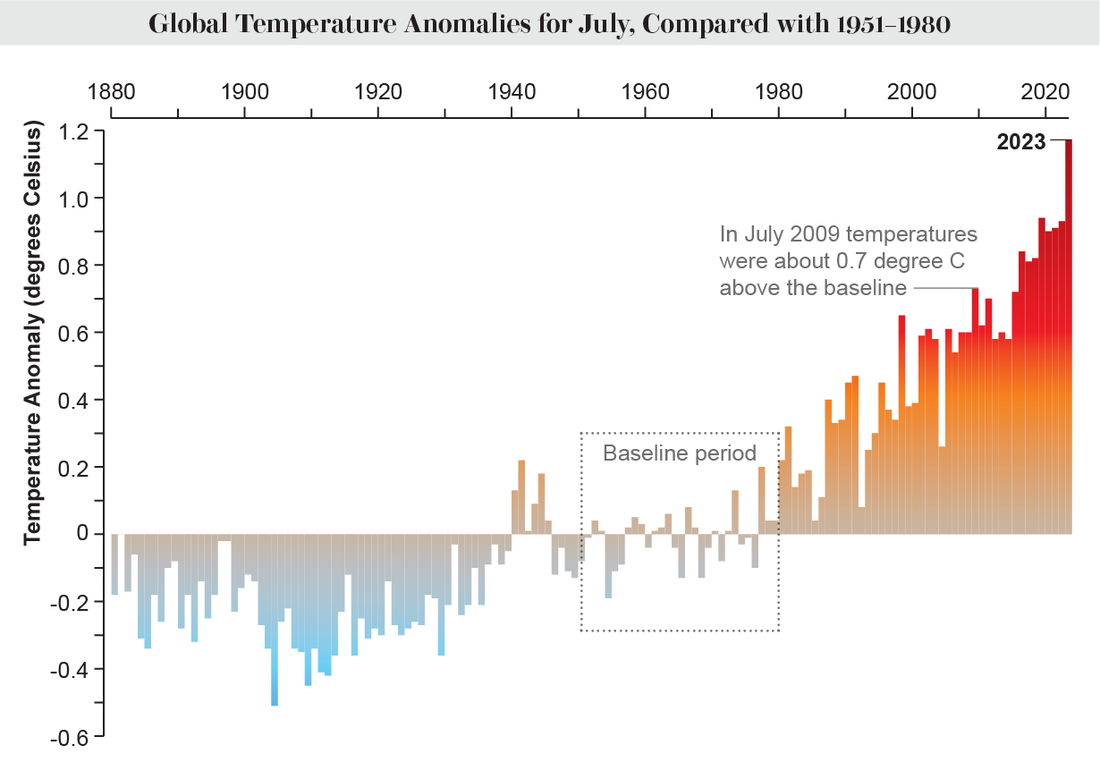
Northern Hemisphere summer "hottest on record". Australia to follow suit.
Share
NASA's recent confirmation has sent shockwaves worldwide: summer 2023 has officially become the hottest on Earth since temperature records began in 1880. The scorching heat waves experienced across North America, Europe, Asia, and beyond have left an indelible mark, leaving many to wonder about the alarming consequences of climate change.
This unprecedented heatwave, which smashed temperature records, is unequivocally attributed to human-induced global warming. Adding to the climate conundrum, a recurring weather pattern known as El Niño has further intensified the sweltering conditions, according to NASA experts.
August, in particular, stood out as a harbinger of the crisis, with temperatures soaring 2.2 degrees Fahrenheit (1.2 degrees Celsius) higher than the seasonal average. This extreme heatwave enveloped a staggering 57 million people in the southern and southwestern United States, pushing the boundaries of what we consider "normal" weather.

The combined temperatures for June, July, and August were 0.41 degrees Fahrenheit (0.23 degrees Celsius) higher than those recorded in all previous summers. NASA's latest findings, unveiled during a climate emergency conference last month, highlighted July 2023 as the hottest July ever recorded, with the preceding five Julys all ranking among the hottest in the past five years.
NASA Administrator Bill Nelson poignantly remarked during the conference, "Just look around you and you'll see what's happened." Record floods in Vermont, unprecedented heatwaves in Phoenix and Miami, and vast swathes of the country enveloped in wildfire smoke paint a grim picture of the changing climate. The ongoing disaster in Hawaii, marked by rampant wildfires, serves as a stark reminder of the devastating consequences of global warming.
July's blistering heat directly contributed to the deadliest wildfire season on record for both Canada and Hawaii. Moreover, it triggered severe rainfall and flash floods across the Mediterranean region, including Greece and Italy, underscoring the far-reaching impacts of this record-breaking heatwave.
El Niño, a recurring climatic phenomenon, played a role in exacerbating this year's heatwave. Every two to seven years, prevailing winds over the Pacific Ocean temporarily reverse direction, causing warmer conditions than usual in Canada and the western United States. This time, exceptionally high sea surface temperatures linked to the return of El Niño contributed significantly to the summer's sweltering temperatures.
However, it's essential to understand that while natural weather patterns like El Niño can influence climate, their contributions pale in comparison to the impact of human activities driving global warming. According to NASA's calculations, El Niño typically leads to a temporary temperature increase of approximately 0.1 degrees Celsius, a minuscule figure compared to the warming we've observed due to human activities.
Gavin Schmidt, a climate scientist and director of GISS, reiterated this point, emphasizing that human-induced climate change remains the primary driver behind soaring temperatures. The new analysis from NASA underscores the urgent need for climate action.
This report arrives on the heels of a sobering assessment by another team of scientists who warned that human activity has pushed the planet beyond its safe operating limits, breaching six out of nine planetary constraints established to assess our deviation from pre-industrial norms.

Additionally, it coincides with a report from the World Meteorological Organization, highlighting that nations are falling short of the long-term goals outlined in the Paris Agreement to curb rising global temperatures.
Heatwaves, both more frequent and severe, are becoming the new norm, and experts predict this trend will persist. This year, heatwaves have even occurred at unexpected times, such as the late three-day heatwave that gripped New York City in early September, shattering records with temperatures soaring 20 degrees above the usual.
As Gavin Schmidt aptly put it, "Unfortunately, climate change is happening. Things that we said would come to pass are coming to pass. And it will get worse if we continue to emit carbon dioxide and other greenhouse gases into our atmosphere." The urgency to address this global crisis cannot be overstated.
You’ve come this far…
Why not venture a little further into A.S.S. - our exclusive Australian Space Society.
And keep thrusting Australia into the deep unknown…
#Space_Aus




